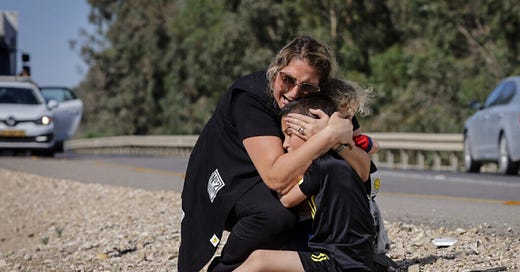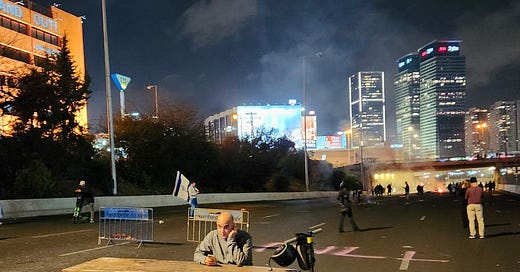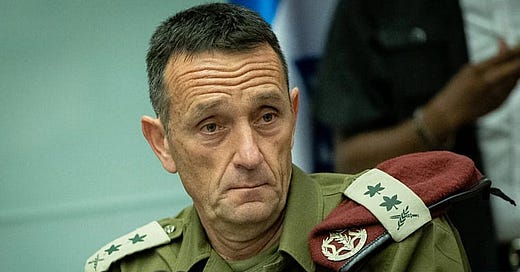

Discover more from Israel from the Inside with Daniel Gordis
What if there's never going to be peace?
Think oboes and violins ... with apologies to the oboists ...
One Yom Hazikaron [Memorial Day for Fallen Soldiers], a student of ours related a story about his army experience during the 2014 war with Hamas. He was part of a tank crew, he said, and they’d been fighting for days. The crew was exhausted, to the point that it wasn’t safe. They were in touch with command, which directed them to a certain house in Gaza not that far away. The house had been “purified,” a rough translation of the Hebrew phrase used to mean it was emptied of enemy combatants. “Go to the house and sleep for a while,” they were told. “We’ll radio you when it’s time to get going again.”
When they entered the house, he told us, the ground floor had been destroyed. There was rubble wall to wall, and nowhere to sleep. But they did see the remnants of Hamas flags, ammunition, and some Hamas literature; whoever had destroyed the ground floor had fired at the right house. They went up a floor, but the situation was the same. Rubble everywhere, more ammunition, nowhere to sleep.
So they went to the top floor, which was in perfect condition. In one room, there were two twin beds. Stuffed animals were spread on the beds, and beneath the animals were sheets, comforters and pillows bedecked with Disney characters. The room looked strikingly similar to the bedrooms of his nieces and nephews, he said. “I looked at those beds,” he told us, “And I understood: one day, the children who had just fled that house and my children who are not yet born will battle each other on this very same battlefield.”
I can still “see” the room, hear his voice, see the faces of other students who were trying to breathe, struggling not to cry. And why would you not cry? Ask most people here – get them at the right moment, when they’re prepared to be honest, and they’ll tell you: This is never going to end.
We’ll come back to that below.
Away from the headlines
In recent hours, the cease-fire that we all knew would come has set in, and so far, seems to be holding. The worst is hopefully over (for now), but even in our neighborhood, which was spared rocket fire the entire time, it’s been a long night. The muezzin from the local mosques blared their loudspeakers to the max, intentionally making it impossible to sleep. So I gave up and went downstairs to write this; from my window at this very moment, the sound of gunfire (presumably into the air) from a nearby Arab village is peppering the early morning dark. A crowd is chanting away in Arabic – it’s clear that the rage that these two weeks have sparked has not even begun to dissipate. Where it might lead is far from clear.
Yet even if that is not clear, some things were clarified during these two awful weeks:
Israeli resilience: Even in recent days, well into the second week of this war, Israelis were proving exceedingly resilient. Even – or especially – in the hardest hit communities, Hamas has triggered a sense of national (Jewish) unity we haven’t experienced in a long time. On Hebrew social media, there were hundreds of comments from people in Ashdod, Ashkelon and towns even closer to the border, who have been under relentless rocket attack for more than ten days. Addressing Netanyahu, they said: “It’s hard here, but we can hold out. Don’t stop this until you get the job done.”
What the IDF could not do: But “getting the job done” is not as simple as it sounds. It is lost on very few Israelis that after almost two weeks of heavy bombardment by one of the world’s most powerful air forces, Hamas was still firing plenty of rockets. Here’s a Facebook post from Assaf Sagiv, a highly respected, right-of-center Israeli public intellectual, who I assure you harbors little sympathy for Gaza or Hamas:
I do not want to sound like a defeatist, but there is nothing more pathetic than an army that boasts about the dubious achievement of bombing a city that has no defenses. No conquest of territories, no victory in a frontal confrontation, no capture of enemy fighters - just a constant crushing from the air of a pathetic militia dug into burrows and hiding behind civilians. I hear reports of the glorious success of the destruction of a building or the elimination of the "Commander of the Islamic Jihad Northern Brigade" - as if he were at minimum Admiral Yamamoto - and I cannot help but wonder: what if God forbid we send this bloated and wasteful PR machine to a real war - For example, against Hezbollah? I have a bad feeling.
Not everyone here would phrase things that sarcastically, but while the Israeli “Home Front” resilience has garnered notice, so, too, has Hamas’ military resilience.
Who won?: Now that the cease-fire is in place, the predictable hand-wringing about “who won” has begun. The political divisiveness that had been set aside during the fighting erupted immediately with talk of the cease-fire. The political right is savaging Netanyahu for having left Hamas intact and having caved to American pressure (though many Israelis were actually surprised by and pleased with Biden’s support for Israel and his pushing back against the likes of Sanders, Tlaib and AOC), while those on the left are arguing that Israel has, once again, lost the international battle for public opinion.
The truth, though, is that we were never going to win either of those battles. The battle for public opinion, even or especially among young American Jews, is an important one, but may not be winnable. (That’s precisely why former Ambassador Ron Dermer admitted recently that Israel’s government has given up on support from American Jews and sees the Evangelicals as its base of American support: that’s the subject of an upcoming column). And Israel was never going to do more damage to Hamas than it did. That would have required a ground invasion for which no one here has the stomach; dozens or hundreds of soldiers would have come back dead, and when it was over, Israel would be stuck with Gaza again bringing us right back to 2005.
So who won? When Israel wakes up in a few hours, that won’t be the major question on people’s minds, but if you asked them, they’d tell you, “Not us.” The only real question is how much time we bought ourselves. Army officials are saying that if we get five years of quiet, it will have been a success. After that, everyone knows, we’re going to do precisely the same thing again. And again.
Which brings us to the question above: What if there will never be peace?
What if there will never be peace?
Last Shabbat, friends from the US stopped by before flying back home. Both of them exceedingly accomplished, he’s a prominent leader in the American Jewish community, who, like many of us, is no less worried about the battles that unfolded between Israeli Jews and Israeli Arabs (I’ll be posting podcasts with both Jews and Arabs so English-speakers can hear the stories of both – see below) than the battle with Gaza. Given that I’d written about how differently Jews and Arabs who are citizens of Israel this country and the conflict, he asked how I thought we could fix it. I told him that I thought we could make it better, but I wasn’t sure that it could ever really be “fixed.”
I could see on his face that he was horrified. “Lay leaders in my community,” he said, “speak about an ‘infrastructure of hope.’ Give Israeli Arabs enough hope – better employment, education and the like – and it seems logical that they should want to be an integral part of Israeli society. But what if you’re right? What if that can’t happen? Where’s the hope?”
Instinctively, I said to him, “The hope is because of the violins and the oboes.”
He looked at me quizzically (and my wife, of course, looked at me as though I’d lost my mind). So I explained: American Jews in the center and on the left tend to evaluate how well Israel is doing on the basis of its “civil rights” challenges: its conflict with the Palestinians, the status of Israeli Arabs. At the end of the day, that’s pretty much what many think about when they think about Israel.
But to think about Israel mostly in terms of those issues is to confuse the oboes and the violins (with abject apologies to the oboists reading this). The winds are an important part of the orchestra; take them out and you impoverish the music. It’s less rich, less satisfying, less glorious. But more often than not, it’s the violins that convey the melody. Take that out, and you’ve got nothing.
At the risk of creating a firestorm: The purpose of Israel’s creation was not peace. Peace (internal or external) is a critical goal, and internally, it may well be a necessary condition for Israel’s long-term survival. But Israel’s purpose is not that. Israel’s purpose is the flourishing of the Jewish people. What matters about Israel is not the conflicts, as critical as they are; what matters about Israel is why we’re here.
Walk around our neighborhood on a Shabbat afternoon, and you will hear as much French as any other language. French Jews, who recently watched as their courts decided not to prosecute a young Muslim man who’d brutally murdered a Jewish woman in her apartment because he’d smoked a joint before the murder and was thus supposedly not responsible for his actions, can see the writing on the wall. But as they watch France become uninhabitable for Jews (and other countries will follow), the one question French Jews do not have to ask is the one Jews had to ask for centuries: Where will we go? Whether there will be anyone who will take them in is no longer a concern. Whether countries will put immigration limits in place to keep Jews out (as the United States and Canada did) is no longer an issue. For the first time in thousands of years, there’s no Jew on the planet who does not have a place to go. That is Israel’s purpose.
Last week’s celebration of Shavu’ot was hardly typical, but on a normal year, the night of Shavu’ot is the best night of the year to be in Jerusalem. It’s customary on Shavu’ot to stay awake until dawn studying; in Jerusalem, on the streets at 2:00 and 3:00 in the morning, there are typically thousands of people of all ages, secular and religious, learned and just beginning, scurrying from one class to another, one venue to another. Through the night, the sidewalks are packed. Witness an entire city come alive with Jews of all stripes embracing a tradition that they live in myriad ways, all with access to those texts because they speak Hebrew, and you get a whiff of the Jewish vitality that is Israel’s purpose.
Go into an Israeli bookstore and check out the hundreds of linear feet of shelves filled with books written in a language that 150 years ago hardly anyone in the world spoke: in that miraculous revival of a “dead” language lies a sense of Israel’s purpose. Jewish culture – literature, music, scholarship, art and yes, even material for Netflix – is being produced by Israelis at a stunning rate. Only a tiny fraction of the literature is translated into English, so it’s a development hidden outside the state. None of the music is translated. You can’t translate art.
And you can’t convey what it means when an entire country lives its life according to the Jewish calendar. Or what it feels like to see the names of some of the exits on the highways correspond to places you know about from the Bible. It takes nothing more than a mere exit sign to remind you that – in a way more profound than most words can convey – you’re home. You are home in a way you can’t be anywhere else.
Ask the thousands of young Israelis who hike the Israel Trail from Eilat in the south to the Golan each year, trekking for two to three months to see the country top to bottom, why that experience was so important to them (often after they’d just finished trekking in Vietnam or Mongolia or wherever). What you’ll hear, in one form or another, is an ode to the rocks and the hills and the streams. What you’ll hear, in one form or another, in an unabashed proclamation of love.
Get on a public bus in the middle of the hot summer. If by chance you happen to see an elderly woman with a purple number tattooed on her forearm seated not far from an armed soldier standing absentmindedly and staring out the window, you are reminded that because we are here, what happened to her can’t happen again. This country was not created so we could have an army, but it was created so that we would determine our own destiny. If it takes an army to ensure we can do that, so be it. Is it worth all the complexity and all the pain? – about that, there is no doubt.
Think about Israel only through the lens of this conflict or that, and you’ve got oboes. Listen to the music of Jewish revival, flourishing, richness – and you hear the violins. The books and the highway exits and the soldiers and the calendar and the language and the love of the land – it’s all part of what it means to be home.
These were two terrible weeks, and we have numerous challenges to face, more internally than externally. So we’ll get to work. But ask Israelis whether – as devastating as these weeks were – if it was all worth it, and you’ll hear: it’s the price we pay to be home.
And it’s the price we’ll continue to pay if we have to, because this time, we’re home to stay.
To give a fuller picture of “Israel from the Inside,” I will be posting podcasts for the subscriber community. These will be conversations with Israelis who can shed light on the Israel that doesn’t make the headlines. We’ll begin by speaking to Israeli Jews and Israeli Arabs who experienced the violence of these past weeks in very different ways. Then, in podcasts and columns exclusively for the subscribing community, we’ll move on to other stories: Israeli Arabs who are serving in the IDF unbeknownst to their families, ultra-Orthodox Jews calling for major change in their communities, liberal Israelis whose take on Israel and Zionism is very different from what you might expect, the question of whether relations between young American Jews and Israel can be healed, and more.
Please feel free to post comments with suggestions for other topics you think would be of interest.



















Thanks for the wisdom and framing of difficult matters in a way that makes sense. Please remember that while the divide between America and Israel may (sadly) be widening there is still a large majority of Jews throughout the world whose love and support is unwavering. Thanks for helping us keep that bridge - intellectually, emotionally and culturally.
Thanks for a different perspective on this issue. A good reminder for us safe (?) in America on why Israel’s existence is critical to us.